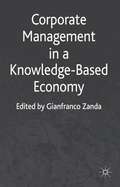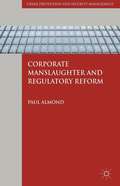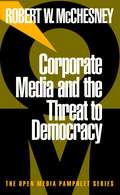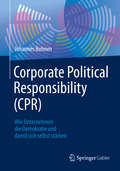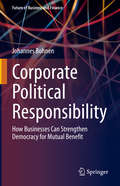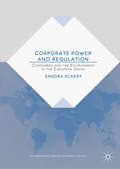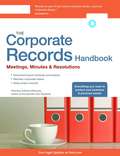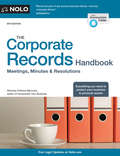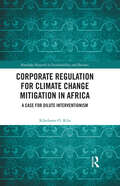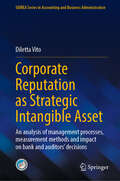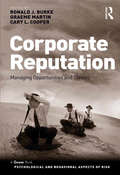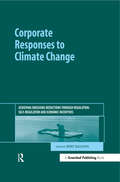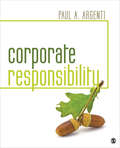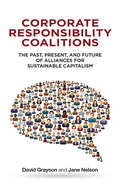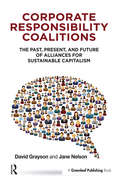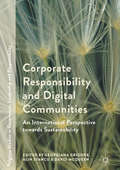- Table View
- List View
Corporate Liability for Transboundary Environmental Harm: An International and Transnational Perspective
by Kirsten Schmalenbach Peter Gailhofer David Krebs Alexander Proelss Roda VerheyenThis open access book aims to elaborate on the legal prerequisites to establish the liability of corporations for transboundary environmental harm, not only by identifying existing liability rules, principles and standards but also by analysing their potential for further legal development. The authors consider international and transboundary liability law to currently be an underutilised tool for international environmental protection. The book seeks to address this by exploring what is needed in terms of legislative action and identifying options for judicial pliability, thereby providing an important legal contribution in furthering the development of an effective international and transnational environmental liability law regime.
Corporate Management in a Knowledge-Based Economy
by Gianfranco ZandaCorporate Management in a Knowledge-Based Economy traces the evolution of corporate governance over time, with a particular focus on the changing nature of power. The control of scarce resources used in production materials, labour and capital has evolved considerably over the past centuries, with government, landowners, non-owner managers, and institutional investors acting as controlling powers at different points in time. In order to appropriately protect the various, and changing, stakeholders, the system of corporate governance has also developed over the years a process that continues to the present. In today's knowledge-based economy, with the rising importance of intangible assets, a new corporate management paradigm is needed. This book incorporates theoretical work as well as practical applications to analyse these developments and explore emerging trends of the 21st century. It examines how the pursuit of profit maximization has resulted in governance failures and it focuses on the prospective role of business ethics (once again in the spotlight following the credit crisis) in helping reform flawed governance structures. It argues that, in the long term, a system based on ethics can maximize social responsibility, customer satisfaction, human capital development and economic targets.
Corporate Manslaughter and Regulatory Reform
by Paul AlmondThis book provides an account of the international emergence of corporate manslaughter offences to criminalise deaths in the workplace during the last twenty years, identifying the limitations of health and safety regulation that have prompted this development.
Corporate Manslaughter in the Maritime and Aviation Industries (Lloyd's Practical Shipping Guides)
by Simon DanielsThis book provides expert analysis of the application of the evolving law in Corporate Manslaughter as it relates to the Maritime and Aviation industries. It will prove to be a useful tool for practitioners and students in this specialised area, as well as those working in the maritime and aviation industries, such as those who will be accountable under the Corporate Manslaughter Act 2007; the Masters and Pilots who manage the risks; and the insurers who underwrite the cost of the risks. The author will discuss areas such as: The liability towards passengers and employees The Prosecution of offenders Comparative analysis of corporate manslaughter in the wider, global industry
Corporate Media and the Threat to Democracy (Open Media Series)
by Robert W. Mcchesney"In this passionate and strikingly lucid essay, Robert McChesney makes clear why all of us should be alarmed about the effects of media mergers on the future of American democracy. This is a must reading for anyone who wants to get a quick understanding of this troubling trend."--Susan J. Douglas, author of Growing Up Female with the Mass Media
Corporate Personhood
by Susanna Kim RipkenThe topic of corporate personhood has captured the attention of many who are concerned about the increasing presence, power, and influence of corporations in modern society. Recent Supreme Court cases like Citizens United, Hobby Lobby, and Masterpiece Cakeshop - which solidified the free speech and religious liberty rights of corporations and their owners - have heightened the controversy over treating corporations as persons under the law. What does it mean to say that the corporation is a person, and why does it matter? In Corporate Personhood, Susanna Kim Ripken addresses these questions and highlights the complexity of the corporate personhood concept. Using a broad, interdisciplinary framework - incorporating law, economics, philosophy, sociology, psychology, organizational theory, political science, and linguistics - this highly original work explores the complex, multidimensional nature of corporate personhood and its implications for corporate rights and duties.
Corporate Political Responsibility (CPR): Wie Unternehmen die Demokratie und damit sich selbst stärken
by Johannes BohnenUnternehmen fördern ihr Geschäft, wenn sie politische Verantwortung übernehmen Unternehmen müssen sich stärker mit den Chancen an den Schnittstellen von Politik und Wirtschaft beschäftigen, denn ihr Geschäftserfolg ist maßgeblich von gesellschaftspolitischen Voraussetzungen abhängig. Mit anderen Worten: Politisch nachhaltige Unternehmensführung ist ein Business Case. Bislang gibt es noch keinen hinreichenden Zugang zu dem Thema der politischen Verantwortung von Unternehmen, der einen konzeptionellen Rahmen mit der praktischen Umsetzung verbindet. Diese Lücke wird nun geschlossen: In diesem Fachbuch erfahren Sie, illustriert durch Schaubilder und Beispiele, wie Unternehmen die notwendige Haltung entwickeln und in konkreten CPR-Handlungsfeldern tätig werden können. Der Autor liefert eine Bestandsaufnahme des öffentlichen Raumes mit seinen Akteuren und zeigt, wie sie durch politische Beiträge die Leistungsfähigkeit des Staates und damit sich selbst stärken können. Unternehmen verfügen dazu über besondere Ressourcen. In ihrem eigenen Interesse sollten sie sich einmischen: unparteiisch im Besonderen, aber parteiisch im Grundsätzlichen – dann, wenn es um unsere freiheitliche Lebensform als solche geht. In drei Buchteilen wird ein umfassendes Corporate Political Responsibility-Konzept vorgestellt: Teil I thematisiert im Sinne einer Bestandsaufnahme den öffentlichen Raum mit seinen wichtigsten Akteuren und dem permanenten Kampf um Deutungshoheit, insbesondere die belastete Beziehung von Wirtschaft und Politik. In den darauffolgenden Teilen steht im Mittelpunkt, wie Unternehmen auf die skizzierten Herausforderungen reagieren können.Verstehen: Wie der öffentliche Raum funktioniertGestalten: Den öffentlichen Raum neu belebenDer öffentliche Raum und seine AkteureDas Governance-Konzept Teil II stellt das CPR-Konzept vor. Hier geht es vor allem um die These, dass es im wirtschaftlichen Interesse von Unternehmen liegt, mit einer neuen gesellschaftspolitischen Haltung und entsprechenden Beiträgen die Leistungsfähigkeit des Staates zu erhöhen. Unternehmen benötigen eine politische Haltung: Corporate Political ResponsibilityGesellschaftliche VerantwortungskonzepteCPR als Business Case – der strategische Mehrwert Teil III widmet sich dann der praktischen Umsetzung von CPR, dem „Political Branding“. Es werden konkrete Handlungsfelder skizziert und Fallbeispiele aufgeführt, die anschaulich zeigen, was politische Markenführung bedeutet. CPR richtig anwenden: Political BrandingPolitische MarkenführungPolitische Markenführung: CPR und LeadershipDie CPR-HandlungsfelderDie Planung von CPR-Maßnahmen Zielgruppe dieses Buches sind primär Entscheider der Wirtschaft (mit ihren CSR-, Strategie- und Kommunikationsabteilungen) sowie Vertreter aus Politik und Verwaltung, aber auch Akteure aus Wissenschaft, Kultur, Medien, Rechtswesen, NGOs, Stiftungen und Kommunikations- bzw. Public Affairs-Beratungen.
Corporate Political Responsibility: How Businesses Can Strengthen Democracy for Mutual Benefit (Future of Business and Finance)
by Johannes BohnenThis book demonstrates how companies can effectively promote their business by assuming political responsibility and expanding their investment concept to include a political component. It shows that the success of companies is crucially dependent on socio-political conditions. In other words: politically sustainable management is a business case. Therefore companies should take a closer look at the opportunities at the interface of politics and business.To date, there has not been a satisfactory assessment of the issue of Corporate Political Responsibility (CPR), which combines a conceptual framework with practical measures for implementation. This book remedies that oversight, and shows how companies can develop the necessary attitude and operate in concrete CPR fields of action, illustrated by diagrams and examples. While doing so, the author explains how CPR is different from shere lobbying or Corporate Social Responsibility (CSR).The author provides an overview of the public realm and its actors, and shows how, through political contributions, they can strengthen the performance of the state and thus their own performance. Companies have unique resources for doing so, and in their own interest they should get involved: being impartial in particular, but partial in principle - when it comes to our liberal way of life as such.
Corporate Power and Human Rights
by Manette Kaisershot and Nicholas ConnollyThere is ample evidence about the negative effects business activity of all types can have on the provision of human rights. Equally, there can be little doubt economic development, usually driven through business activity and trade, is necessary for any state to provide the institutions and infrastructure necessary to secure and provide human rights for their citizens. The United Nations and businesses recognise this tension and are collaborating to effect change in business behaviours through voluntary initiatives such as the Global Compact and John Ruggie’s Guiding Principles. Yet voluntary approaches are evidently failing to prevent human rights violations and there are few alternatives in law for affected communities to seek justice. This book seeks to robustly challenge the current status quo of business approaches to human rights in order to develop meaningful alternatives in an attempt to breech the gap between the realities of business and human rights and its discourse. This book was previously published as a special issue of the International Journal of Human Rights.
Corporate Power and Regulation: Consumers and the Environment in the European Union (International Series on Public Policy)
by Sandra Eckert“A novel, insightful and provocative foray into the abilities, capacities and limits of corporate power on the one hand and public power and capacities on the other hand. Eckert offers new and refine insights on core issues in the theories of public and private interest regulation.”—David Levi Faur, Hebrew University of Jerusalem, Israel“This impressive book breaks important ground in the regulatory governance literature by bringing in a fresh corporate perspective. Based on a set of fascinating case studies of European regulation, Eckert compellingly unpacks key facets of corporate power. A must-read for regulation scholars who often neglect the targets of regulation!”—Burkard Eberlein, York University, Canada“This book offers systematic and empirically fascinating insights into the regulatory power of corporations which unfolds outside the traditional political arenas. Its policy effects have important implications for the target groups of regulation, the general public, and the democratic political process as such. The conceptualization and use of rich empirical sources make for a compelling read.”—Adrienne Héritier, European University Institute, ItalyThis book takes a fresh look at corporate power in the regulatory process. It examines how corporations seek to prevent, shape, make or revoke regulation. The central argument is that in doing so, corporations utilise distinct power resources as experts, innovators and operators. By re-emphasising the proactive role of business, the book complements our acquired knowledge of policymakers’ capacity to put pressure on, or delegate power to private actors. Empirically, the book covers European consumer and environmental policies, and conducts case studies on the chemical, paper, home appliance, ICT and electricity industries. A separate chapter is dedicated to the assumption that Brexit will lead to an unprecedented result of EU regulation being lifted, and how this could put corporate power in regulation at risk. This book provides a new perspective on the policy implications of corporate power to scholars, students and practitioners alike.
Corporate Real Estate Asset Management: Strategy and Implementation
by Nick Nunnington Barry P. HaynesIt is important for those studying and practicing in real estate and property management to learn to manage property assets effectively, to be able to provide their companies with effective property and facilities solutions. This book raises the awareness of how real estate management can support business, transform the workplace and impact upon people and productivity, ensuring that costs are minimized and profit maximized. Written for advanced undergraduate students on property related courses, it provides them with a rounded understanding by aligning the subject with estates management, facilities management and business strategy. Case studies and action plans provide real insight and make this book an essential reference for those at the start of their careers in real estate and facilities management.
Corporate Records Handbook, The: Meetings, Minutes & Resolutions
by Anthony MancusoKeep your corporation valid in the eyes of the IRS and courts. If you've taken the time to turn your business into a corporation, chances are you'd like to see it stay that way. Your business card may say "incorporated," but if the courts and the IRS think differently, it's closing time. Meeting minutes are the primary paper trail of your corporation's legal life, so it's essential to know when and how to prepare these minutes. The Corporate Records Handbook provides all the forms and instructions you need to stay legal, including: Call of Meeting Meeting Participant List Notice of Meeting Certification of Mailing Acknowledgment of Receipt of Notice of Meeting Shareholder Proxy Meeting Summary Sheet Minutes of Annual Shareholders' Meeting Minutes of Special Shareholders' Meeting Minutes of Annual Directors' Meeting Minutes of Special Directors' Meeting Waiver of Notice of Meeting Approval of Corporate Minutes by Directors of Shareholders Cover Letter for Approval of Minutes of Paper Meeting Written Consent to Action Without Meeting The Corporate Records Handbook gives you the forms you need to keep required records, plus more than 75 additional resolutions to insert into your minutes. This edition has been updated to reflect the latest changes in the law. Forms are available to download at nolo.com.
Corporate Records Handbook, The: Meetings, Minutes & Resolutions
by Anthony MancusoKeep your corporate status—and avoid personal liability Incorporating your business is an important first step in obtaining limited liability status. To keep that status, you must observe a number of legal formalities, including holding and documenting shareholder and director meetings. Meeting minutes form the primary paper trail of a corporation’s legal life—and The Corporate Records Handbook provides all the instructions and forms you need to prepare them. Minutes forms include: • Notice of Meeting • Shareholder Proxy • Minutes of Annual Shareholders’ Meeting • Minutes of Annual Directors’ Meeting • Waiver of Notice of Meeting, and • Written Consent to Action Without Meeting. You’ll also find more than 75 additional resolutions which let you: • elect S corporation tax status • borrow or lend money • adopt pension and profit-sharing plans • authorize bank loans • authorize a corporate line of credit • set up employee benefit plans • purchase or lease a company car • amend articles and bylaws • and more! The Corporate Records Handbook gives you the forms you need to keep required records.. This edition has been updated to reflect the latest changes in the law.
Corporate Regulation for Climate Change Mitigation in Africa: A Case for Dilute Interventionism (Routledge Research in Sustainability and Business)
by Kikelomo O. KilaThis book critically analyses the prospects of overhauling the legal framework of climate change regulation of corporations in African state. It adopts the dilute interventionism regulatory framework to tackle the culture of regulatory resistance by corporations in Africa. Over the course of this volume, Kikelomo O. Kila critiques the climate change legal framework in all 53 African states and conducts an in-depth case study of the two largest economies in Africa – Nigeria and South Africa – to highlight the commonality of the problems in Africa and the potential for the dilute interventionism paradigm to significantly address these problems. The book establishes why African states should directly intervene through legislative mechanisms to compel corporations to incorporate climate change mitigation in their business activities. It proposes that this direct intervention should comprise a blend of prescriptive and facilitative mechanisms structured in a dilute interventionism regulatory model. Overall, this volume argues that implementing this model requires the institution of a strong and independent regulator with a veto firewall protection system that guarantees its de facto independence from government and external influences. Corporate Regulation for Climate Change Mitigation in Africa will be of great interest to climate change stakeholders at the international, regional, and domestic levels, policymakers, regulatory practitioners, and legal experts on corporate regulation. It will also be an insightful resource for students and scholars of climate change and environmental law, policy, and governance.
Corporate Reorganisations in China: An Empirical Analysis
by Zinian ZhangThe first comprehensive empirical study on corporate bankruptcy reorganizations in the second largest economy, China, investigating the formal corporate restructurings handled by China's courts between 2007 and 2015. The data and analysis presented in the book provide a unique lens from which China's newly-enacted Chapter 11-styled corporate reorganization law, both in the books and in practice, can be understood and from which the interaction between business and state in dealing with corporate bankruptcies in China could be better comprehended. This book benefits from the author's ten-year business law practice in China, and his insights on China's judicial and political system considerably enrich the arguments. In particular, this book sheds light on commencement of bankruptcy reorganizations, control models, corporate reorganization financing, value distribution, approval of reorganization plans and cross-border reorganizations under the China Enterprise Bankruptcy Law of 2006.
Corporate Reputation as Strategic Intangible Asset: An analysis of management processes, measurement methods and impact on bank and auditors’ decisions (SIDREA Series in Accounting and Business Administration)
by Diletta VitoThis book offers a comprehensive overview of corporate reputation, aiming to enhance understanding, management processes, and measurement methods associated with this crucial concept. By integrating perspectives from various disciplines such as strategic management, organizational theory, and accounting, the book presents a holistic framework for both enhancing and safeguarding corporate reputation. The book explores essential processes such as creating, acquiring, protecting, and repairing reputational capital, employing a stock and flow model to establish a robust framework for reputation management. Furthermore, the book studies the role of corporate communication and voluntary disclosure in establishing trust and credibility with stakeholders. It provides actionable strategies for reputational risk management and crisis management, emphasizing the critical importance of swift and transparent communication in safeguarding and restoring reputational capital. By addressing stakeholder-specific dynamics and offering detailed guidelines on reputation management, the book underscores the necessity of tailored efforts to meet the unique needs and concerns of diverse stakeholder groups. Designed for scholars, practitioners, business leaders, and students in business and management disciplines, this book aims to deepen their understanding of the strategic importance of corporate reputation.
Corporate Reputation: Managing Opportunities and Threats (Psychological and Behavioural Aspects of Risk)
by Graeme Martin Ronald J. BurkeIncreasing media scrutiny, global coverage and communication via the internet means corporate reputation can be damaged quickly, and failing to successfully address challenges to corporate reputation has consequences. Companies generally suffer almost ten times the financial loss from damaged reputations than from whatever fines may be imposed. According to Ernst & Young, the investment community believes up to 50 per cent of a company's value is intangible - based mostly on corporate reputation. So recognizing potential threats, or anticipating risks, emerges as a critical organizational competence. Organizations can regain lost reputations, but recovery takes a long time. Corporate Reputation contains both academic content along with practical contributions, developed by those serving as consultants or working in organizations in the area of corporate reputation and its management or recovery. It covers: why corporate reputation matters, the increase in reputation loss, threats to corporate reputation, monitoring reputation threats online and offline, the key role of leadership in reputation recovery, and making corporate reputation immune from threats. Any book that is going to do justice to a subject that is so complex and intangible needs imagination, depth and range, and this is exactly what the contributors bring with them.
Corporate Responses to Climate Change: Achieving Emissions Reductions through Regulation, Self-regulation and Economic Incentives
by Rory SullivanGiven the scale of the greenhouse gas emissions reductions that are seen as necessary to avert the worst effects of climate change, policy action is likely to result in a complete reshaping of the world economy. The consequences are not confined to 'obvious' sectors such as power generation, transport and heavy industry; virtually every company's activities, business models and strategies will need to be completely rethought. In addition, beyond their core business activities, companies have the potential to make important contributions to reducing greenhouse gas emissions through the allocation of capital, through innovation and the development of new technologies, and through their influence on the actions taken by governments on climate change.Corporate Responses to Climate Change has been written at a crucial point in the climate change debate, with the issue now central to economic and energy policy in many countries. The book analyses current business practice and performance on climate change, in the light of the dramatic changes in the regulatory and policy environment over the last five years. More specifically, it examines how climate change-related policy development and implementation have influenced corporate performance, with the objective of using this information to consider how the next stage of climate change policy – regulation, incentives, voluntary initiatives – may be designed and implemented in a manner that delivers the real and substantial reductions in greenhouse gas emissions that will be required in a timely manner, while also addressing the inevitable dilemmas at the heart of climate change policy (e.g. how are concerns such as energy security to be squared with the need for drastic reductions in greenhouse gas emissions? Can economic growth be reconciled with greenhouse gas emissions? Can emissions reductions be delivered in an economically efficient manner?).The book focuses primarily on two areas. First, how have companies actually responded to the emerging regulatory framework and the growing political and broader public interest in climate change? Have companies reduced their greenhouse gas emissions and by how much? Have companies already started to position themselves for the transition to a low-carbon economy? Does corporate self-regulation – unilateral commitments and collective voluntary approaches – represent an appropriate response to the threat presented by climate change? What are the barriers to further action? Second, the book examines what the key drivers for corporate action on climate change have been: regulation, stakeholder pressure, investor pressure. Which policy instruments have been effective, which have not, and why? How have company actions influenced the strength of these pressures?Corporate Responses to Climate Change is a state-of-the-art analysis of corporate action on climate change and will be essential reading for businesses, policy-makers, academics, NGOs, investors and all those interested in how the business sector is and should be dealing with the most serious environmental threat faced by our planet.
Corporate Responsibility
by James E. Post Archie B. Carroll Kenneth J. Lipartito Patricia H. Werhane Kenneth E. GoodpasterThis thought-provoking history of corporate responsibility in the USA is a landmark publication documenting the story of corporate power and business behavior from the mid-eighteenth century to the modern day. It shows how the idea of corporate responsibility has evolved over time, with the roles, responsibilities and performance of corporations coming increasingly under the spotlight as new norms of transparency and accountability emerge. Today, it is expected that a corporation will be transparent in its operations; that it will reflect ethical values that are broadly shared by others in society; and that companies will enable society to achieve environmental sustainability as well as a high standard of living. As we enter the second decade of the twenty-first century, the social, political and economic landscape is once again shifting: the need for an informed public conversation about what is expected of the modern corporation has never been greater.
Corporate Responsibility
by Paul A. Argenti"This is the cutting-edge textbook on a managerial approach to corporate responsibility. Students and executives will benefit a great deal by studying the cases and best practices that are here. It’s a terrific book." —Ed Freeman, Elis and Signe Olsson Professor of Business Administration, Darden School of Business, University of Virginia Corporate Responsibility offers a concise and comprehensive introduction to the functional area of corporate responsibility. Readers will learn how corporate responsibility is good for business and how leaders balance their organization’s needs with responsibilities to key constituencies in society. Author Paul A. Argenti engages students with new and compelling cases by focusing on the social, reputational, or environmental consequences of corporate activities. Students will learn how to make difficult choices, promote responsible behavior within their organizations, and understand the role personal values play in developing effective leadership skills.
Corporate Responsibility
by Paul A. Argenti"This is the cutting-edge textbook on a managerial approach to corporate responsibility. Students and executives will benefit a great deal by studying the cases and best practices that are here. It’s a terrific book." —Ed Freeman, Elis and Signe Olsson Professor of Business Administration, Darden School of Business, University of Virginia Corporate Responsibility offers a concise and comprehensive introduction to the functional area of corporate responsibility. Readers will learn how corporate responsibility is good for business and how leaders balance their organization’s needs with responsibilities to key constituencies in society. Author Paul A. Argenti engages students with new and compelling cases by focusing on the social, reputational, or environmental consequences of corporate activities. Students will learn how to make difficult choices, promote responsible behavior within their organizations, and understand the role personal values play in developing effective leadership skills.
Corporate Responsibility Coalitions: The Past, Present, and Future of Alliances for Sustainable Capitalism
by David Grayson Jane NelsonIt is estimated that there are more than 110 national and international business-led corporate responsibility coalitions. Given the growing reach and significance of these alliances, there is now a critical need for an informed and balanced analysis of their achievements, their progress, and their potential. InCorporate Responsibility Coalitions, the first book to chronicle the subject, David Grayson and Jane Nelson explore the past, present, and future of these coalitions. They consider the emergence of new models of collective corporate action over the past four decades; the increasing number of these coalitions, their diversity and complexity; and how they network with each other and a broader set of institutions that promote sustainable capitalism. Drawing on their global study, the authors light the way for the future development of these influential alliances. In addition, they provide in-depth profiles of the most strategic, effective, and long-standing coalitions.
Corporate Responsibility Coalitions: The Past, Present, and Future of Alliances for Sustainable Capitalism
by David Grayson Nelson JaneThe significance of business-led corporate responsibility coalitions is indisputable. The WBCSD has 200 member companies with combined annual revenues of US$7 _trillion_; the UN Global Compact has almost 8,000 corporate members, over two-thirds of them from developing countries. It is estimated that there are more than 110 national and international generalist business-led CR coalitions. But there is now urgent need for informed and balanced analysis of their achievements, their progress and their potential.Why did these coalitions start and grow? What have been their impacts? Where are they heading now? Where should they be going? What is the future? In a period of austerity, the business and public sector must decide whether funding these coalitions is a priority.To meet current crises, there will have to be a great deal more business involvement; but efforts of individual corporations will not be sufficient. There is also a need for far more collective action among companies and more collaborative action between different sectors of society. Business-led CR coalitions with their decades of convening experience could play an important role in this process - if they are fit for purpose going forward.Authors David Grayson and Jane Nelson have been actively involved in such coalitions for decades. In Corporate Responsibility Coalitions they first explore the past, present and future of these coalitions: the emergence of new models of collective corporate action over the past four decades; the current state of play, and the increasing number, diversity and complexity in terms of how they not only network with each other but also engage in a much broader universe of institutions that are promoting responsible business practices. In addition, the book provides in-depth profiles of the most strategic, effective and long-standing coalitions, including: Business for Social Responsibility; Business in the Community; CSR Europe; Instituto Ethos; International Business Leaders Forum; the UN Global Compact; and the WBCSD.This book will be required reading for key supporters and potential partners of such coalitions in companies, governments, international development agencies, foundations, non-governmental organizations, academic institutions and think-tanks. It also aims to inspire a future generation of leaders to be more aware of the role of business as a partner in driving more inclusive, green and responsible growth, and to help them develop new types of leadership skills so that they can be effective in finding multi-stakeholder solutions to complex and systemic challenges.
Corporate Responsibility and Digital Communities: An International Perspective towards Sustainability (Palgrave Studies in Governance, Leadership and Responsibility)
by Georgiana Grigore Alin Stancu David McQueenThis book explores conceptualizations of CSR and sustainability in the digital economy, focusing upon points of intersection between CSR and online communities. Reflecting on new areas of responsibility that organisations must face in a globalised economy, the contributions explore the ways CSR is being communicated, challenged and reshaped in a rapidly evolving online context. Up-to-date research from around the world shows how diverse communities, citizens and stakeholders are engaging with, and making demands on, organisations in novel ways that pay little respect to international borders. With online communities increasingly influencing the way in which business is carried out and perceived, the case studies explored here offer a useful indication of the variety of new developments and controversies that have emerged in the field of CSR. This book will appeal to postgraduate students and researchers of CSR and CSR communications, as well as communication, public relation and corporate responsibility practitioners.
Corporate Responsibility and Sustainable Development: An Integrative Perspective
by Lez Rayman-Bacchus Philip R WalshThis book explores the overlapping interests of corporate responsibility and sustainable development, specifically focusing on the dynamics of social change, sustainability governance and evaluation, and creating social value. Corporate Responsibility and Sustainable Development: An Integrative Perspective draws on ideas and research relevant to both concepts, highlighting the interdependent nature of corporate strategy and policymaker ambition. The authors seek to capture that any evaluation of responsibility for sustainable development demands multiple lenses. They propose an integrative understanding to tackling global challenges around sustainable development and focus on four themes: contextualisation; perspectives on social change; sustainability governance and evaluation; and creating social value. Overall, the book takes an evaluative approach, using these themes as lenses for engaging with global challenges, which encourages reflection and informed action. Written by two highly experienced authors, this book integrates short case studies and chapter questions throughout the text, in order to reinforce learning and help readers reconcile ideas presented with real world issues. It will be an essential resource for tutors and advanced undergraduate and postgraduate students of business, governance and corporate governance, corporate social responsibility (CSR), sustainability and sustainable development, stakeholder theory, business ethics, and politics.

